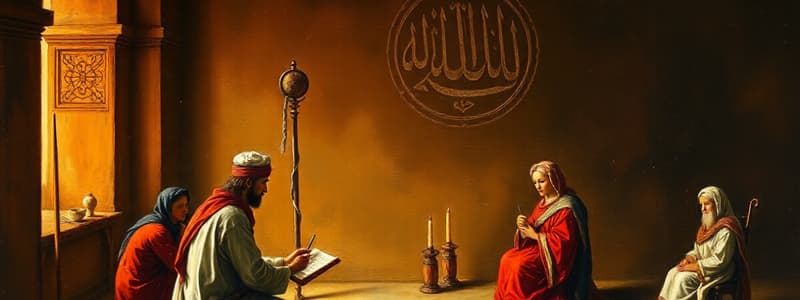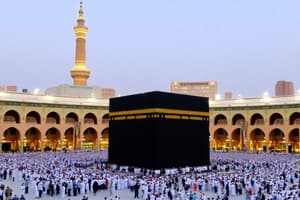Podcast
Questions and Answers
Why is the year 619 often referred to as the "Year of Sorrows" for Muhammad?
Why is the year 619 often referred to as the "Year of Sorrows" for Muhammad?
619 marked the deaths of Muhammad's wife Khadija and his uncle Abu Talib, two key figures who provided support and protection.
What impact did Khadija's death have on Muhammad?
What impact did Khadija's death have on Muhammad?
Khadija's death was a significant loss for Muhammad, as she was a strong supporter of his message and provided emotional and financial support.
How did Abu Talib's death affect Muhammad's position within the Quraysh tribe?
How did Abu Talib's death affect Muhammad's position within the Quraysh tribe?
Abu Talib's death left Muhammad without the powerful protection he had as a member of the Quraysh tribe, making him more vulnerable to persecution.
Based on the text, what were two ways that Khadija supported Muhammad?
Based on the text, what were two ways that Khadija supported Muhammad?
What hardships faced Muhammad during this period of time?
What hardships faced Muhammad during this period of time?
What does the term 'Islam' mean, and what fundamental belief does it promote?
What does the term 'Islam' mean, and what fundamental belief does it promote?
Describe the social structure of 6th Century Arabia before the advent of Islam.
Describe the social structure of 6th Century Arabia before the advent of Islam.
What significant role did Mecca play in pre-Islamic Arabia?
What significant role did Mecca play in pre-Islamic Arabia?
How did Muhammad’s early life contribute to his reputation as a trustworthy individual?
How did Muhammad’s early life contribute to his reputation as a trustworthy individual?
At what age did Muhammad receive his first revelation, and what is the significance of this event?
At what age did Muhammad receive his first revelation, and what is the significance of this event?
What was the nature of Muhammad's early revelations, and how were they received?
What was the nature of Muhammad's early revelations, and how were they received?
What challenges did early Muslims face from the Quraysh tribe?
What challenges did early Muslims face from the Quraysh tribe?
Who were the key figures supporting Muhammad during the early stages of his ministry?
Who were the key figures supporting Muhammad during the early stages of his ministry?
Flashcards
The Year of Sorrows
The Year of Sorrows
The year 619, marking a time of great loss and hardship for the Prophet Muhammad.
Khadija
Khadija
Muhammad's wife and a crucial figure in his life, known for her unwavering support.
Abu Talib
Abu Talib
Muhammad's uncle and a significant protector and supporter.
Persecution
Persecution
Signup and view all the flashcards
Hadith
Hadith
Signup and view all the flashcards
Monotheism
Monotheism
Signup and view all the flashcards
Who is Muhammad?
Who is Muhammad?
Signup and view all the flashcards
What is the Kaaba?
What is the Kaaba?
Signup and view all the flashcards
What was Mecca like before Islam?
What was Mecca like before Islam?
Signup and view all the flashcards
Who are the Quraysh?
Who are the Quraysh?
Signup and view all the flashcards
What is the first revelation?
What is the first revelation?
Signup and view all the flashcards
Who were the early Muslims?
Who were the early Muslims?
Signup and view all the flashcards
What were Muhammad's early teachings?
What were Muhammad's early teachings?
Signup and view all the flashcards
Study Notes
The Beginnings of Islam
- Islam means surrender and emphasizes the oneness of God, rejecting the worship of idols.
- Muhammad's revelations are central to the origins of Islam.
- Muhammad was born in 6th-century Arabia, a region governed by tribal systems, not a single authority.
- 6th-century Arabia was a tribal society, characterized by revenge and frequent conflicts.
- Nomadic Bedouin tribes roamed the Arabian deserts, while settled agricultural communities thrived near oases.
- Mecca, a significant religious center, housed the Kaaba, a central pilgrimage site.
- The Kaaba was a site of worship for numerous idols, important to different tribes and communities.
- Muhammad was born into the powerful Quraysh tribe, benefiting from the economic activity connected with the Kaaba's pilgrimages.
- Muhammad's family held a prominent position within the Quraysh tribe, yet his early life was challenging, marked by the loss of his father before birth, his mother at age six, and his grandfather at eight. This meant he lacked the usual social privileges of a tribal member.
- Muhammad became a merchant, traveling with his uncle Abu Talib, earning a reputation for integrity and honesty.
- At age 25, Muhammad married Khadija, a well-off widow, who admired his trustworthiness and honesty.
- Khadija was the first follower of Muhammad's message and remained a steadfast supporter throughout his early ministry.
- Muhammad received his first revelation from God in a cave outside Mecca at age 40.
- The revelation occurred on Jabal an-Nour (Mountain of Light), in the Cave Hira.
- Initially hesitant, Muhammad's faith was reinforced by Khadija and her Christian relative.
- Muhammad's initial revelations focused on monotheism and were kept private for three years.
- Muhammad publicly preached his revelations three years after the first.
- Muhammad's teachings, particularly against idol worship, clashed with the Meccan establishment, which profited from the existing religious practices.
- The Quraysh tribe, including many of Muhammad's family members, persecuted early Muslims, forcing many to seek refuge in the Kingdom of Axum (modern-day Ethiopia and Eritrea).
- The year 619 witnessed the deaths of Muhammad's wife, Khadija, and his uncle Abu Talib.
- This period, known as the Year of Sorrows, was a profoundly difficult time for Muhammad, who had been preaching for roughly nine years.
- Muhammad's wife, Khadija, was a vital figure in his life, and her passing was a significant loss.
- The death of Muhammad's uncle Abu Talib deprived him of protection within the Quraysh tribe.
- Muslims endured persecution for their beliefs, and Muhammad faced the loss of key family members and supporters.
- Hadith accounts state that God never gave him a better partner in life than Khadija, that she supported him when others doubted him and shared her resources with him when others were withholding them.
Studying That Suits You
Use AI to generate personalized quizzes and flashcards to suit your learning preferences.




